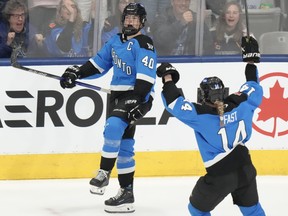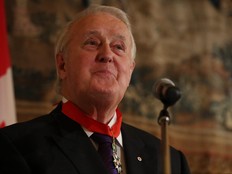Blayre Turnbull's leadership key to Toronto Sceptres' PWHL success

Article content
Imagine being one of the best in the world at your craft, knowing without a shadow of doubt in your mind that this one element of your craft separated you even further from the truly elite in world.
Then imagine being told by the people who control your future in that craft that you are wrong.
That one thing you were so sure was your most identifying talent, that separated you from everyone else, was in fact the skill that you needed to improve in order to continue doing what you truly love to do.
How would you handle that?
Now, consider getting this news at the age of 23, having already played a pivotal role at the highest levels of that craft.
How would you react then?
This is the story of Blayre Turnbull, captain of the Toronto Sceptres, and not just how she handled that situation but the way in which she went about it and how that translates to the consistent winning approach she brings to the Sceptres’ locker room every day.
Holding up the Sceptre
Through nearly two full regular seasons, the Toronto Sceptres have been for, the most part, at or near the top of anyone’s list for team most likely to win a Walter Cup.
A year ago, they started slowly, righted the ship and ran off a league-best 11-game winning streak to easily become the first-ever regular-season champs in the PWHL.
Their playoff run began just as hot before an injury to leading goal scorer and eventual first-year MVP Natalie Spooner derailed things ending their season prematurely as they dropped three in a row to the Minnesota Frost who would go on to win that first ever Walter Cup.
Again this year, there was the slow start, this time augmented by the absence of Spooner but once again the team worked its way out of its early struggles to earn points in 14 of 15 consecutive games that took them from dead last to second in the league with three games remaining.
A repeat of another regular-season championship remains within reach.
The perseverance and the ability to stick with things on two separate stretches like the Sceptres experienced and then to come out stronger on the other side is a testament to the leadership the organization boasts.
It starts at the top with GM Gina Kingsbury and head coach Troy Ryan, a duo that has proven itself time and again with Canada’s national women’s team. But leadership can’t end with off-ice personnel. Someone in the trenches every day, taking the ice and sharing the failures and successes has to carry that burden as well.
Ryan established a leadership group of six players when the team first came together. It began as six and then, with the trade that sent Jocelyne Larocque to Ottawa, it was down to five.
At the front of that group, as one would expect is the team’s captain, Blayre Turnbull.
Turnbull, a 31-year-old native of Stellarton, N.S. has worn the ‘C’ since the team’s inception, just as Kingsbury and Ryan envisioned it when they made her one of the three foundational signings — Turnbull, Sarah Nurse and Renata Fast — a trio that would form the core of their team.
It’s a given in any sport that the players that score and produce the offence are generally the players that receive the most attention, the ones who receive the lion’s share of the credit.
In Toronto, those players are named Spooner, Nurse, Fast, Hannah Miller or Daryl Watts.
Turnbull’s name may not hit the scoresheet with the regularity of that handful, but if she’s not scoring the goals or setting them up, she’s helping create the opportunities.
What sets Turnbull apart from everyone is her defensive responsibility while contributing to all those other flashier areas. She always has been this way. It’s in her DNA. The daughter of a hockey coach, it’s just the way she was raised.

Ryan has a hard time containing himself when the topic of her impact on this team is brought up.
“She is just, at the core, she’s a leader and she wants what is best for the team and to be honest, at times, one of her dangers is she sacrifices so much of herself to get it,” Ryan said. “To me that’s the ultimate leader, when you’re willing to do that and do it with bells on kind of thing.
Ryan goes to great lengths to ensure Turnbull knows the impact her play has on the outcome of games regardless of who is getting the headlines.
“I showed her some stats (recently), some advanced stats like strength of opposition,” Ryan continued. “She is right at the top on our team. Why would I expect (her) to score a bunch of goals if I’m putting (her) in the worst possible position? She leads the team in defensive starts so I try to show her, we know we are putting you in a terrible situation because we know you can deal with it and we know you will do it. I think it’s just now that she is accepting that and she knows now that it is appreciated by her teammates as well.”
In short, she is a coach’s dream player. A competitor who will do whatever it takes to win a game.
And if she’s a coach’s dream, just imagine what it’s like to play against her.
Kali Flanagan no longer has to do that, but for years opposing Turnbull on the international stage in those always-tough Canada-US matchups, the Boston-area native had plenty of opportunities to experience Turnbull as an opponent. Flanagan did not enjoy it.
Turnbull’s combination of speed, physicality and superior strength, not to mention her love to compete, puts her at the top of a very short list of players in the PWHL no one wants to play against.
“She’s one of the hardest players to play against because she is such a hard worker and such a great skater,” Flanagan said. “She’s all over you. She’s aggressive and you know you are getting 150% from her any time she’s on the ice so playing against her is AWFUL. And being on her team is awesome because, for me as a defender and her being a centre, she’s always in the right spot, always talking. Always busting back to be in the right spot for us on the breakout so I know I love playing with her.”
But as impressive as that is, it still probably pales in comparison to what she brings to the table as the team’s locker-room leader.
As mentioned, she has plenty of help in the room from the likes of Fast and Flanagan, Nurse and Emma Maltais, all members of that leadership group, but it’s Turnbull that wears the ‘C’ and it’s Turnbull that is the face of the Sceptres’ leadership.
Kingsbury and Ryan knew they had their captain from years of being around her on the national team and, for Ryan, years before that as they crossed paths in the tight Nova Scotia hockey community.
That confidence was confirmed at the end of the first year that ended in that disappointing five-game series loss to Minnesota.
In her one-on-one meetings with every one of the Sceptres’ players, Kingsbury wanted input from everyone on where they felt the team could improve.
She didn’t ask specifically about leadership, but that didn’t stop just about every single player in those meetings telling Kingsbury that Turnbull was the best leader with whom they had ever played.
There are any number of reasons why Turnbull is the captain of the Toronto Sceptres.
It starts with her team-first always approach and trickles down from there.
She’s responsible to a fault, holding herself to a standard that is beyond anything she asks of her teammates but, by the same token, has no hesitancy calling out a teammate if she views their conduct as lacking.
Ryan has found himself on the receiving end of such a confrontation — though that may be too strong a word — with his captain on a number of occasions over the past year and a half.
Each time it was a message Ryan delivered to the team that Turnbull wasn’t sure was all that clear. Rather than let it slide she pulled her coach aside and asked him point blank if the message she got from him was the one he intended.
“She’ll say this is what you said and this is how it landed to me,” Ryan said. “’Is that how you meant it to land?,’ she’ll ask. That’s a leader to me. That’s someone who just gets it, doesn’t want to have the bad thoughts that a comment may have left and wants to tidy it up.
“She wants to have that conversation. We always end in a good place but often she is the one that sets the stage for us to be in a good spot because she doesn’t mind having those tough conversations.”
With Turnbull there is no grey area, no chance for misinterpretation because she tackles everything just like she plays the game — head on.
She’s a little more tactful about it off ice than on, where speed and brute force are often her best weapons, but in the end the outcome, on or off the ice, is almost always clarity.
Ryan stopped being surprised by the lengths Turnbull is willing to go to make her team or even herself better a long time ago.
But the topper may have come a full six years before the PWHL even came into existence which is where this story began.
Getting the edge in skating lessons
At this stage in her career, Turnbull had already made the senior women’s Canadian team, but was still a year away her first centralization with the team in advance of her first Olympics. Just 23 she already had established herself with the national team.
Out of the blue came word via Ryan, then an assistant with the women’s national team, that the Hockey Canada brain trust felt it would be in Turnbull’s interest to seek out additional help with her skating.
It was a bombshell for Turnbull.
“When I was about to start centralization, actually the summer before that, they suggested it would be in my best interest to do some power skating and basically said that I really needed to improve my edgework if I wanted to play at the next level,” Turnbull said.
That news coupled with the fact that she was the only member of the national team tasked with this off-season work had Turnbull more than just a little peeved.
“Learning to skate as a kid, I just never did edgework,” Turnbull said. “That’s not how we learned to skate. We learned how to skate going up and down the ice.
“… At first I was pissed off that I had to do it because I was the only one that was told that they had to improve their skating,” Turnbull recalls. “I had always thought my skating was my strength, so that was the first kind of time that I had to reflect and think that maybe I’m not evaluating my play properly but it was honestly one of those things where I was really pissed off going into it for a couple of reasons.
“One, I was like, I disagree this is what I need to improve — just being stubborn — and two, I was the only one who had to do it and I’m on the ice with no stick, no pucks, a lady whose background is in figure skating and I’m a hockey player. I want to work on my puck skills, my shot, all that stuff.”
The lady in question wasn’t just any figure skater. She was a former national pairs champion and a respected international judge.
Marie Bowness, previously Marie McNeil when she was partnered with Rob McCall, wasn’t new to helping hockey players work on their skating.
Then and still today there are no shortage of NHLers arriving at her door asking for her help.
Turnbull, though, wasn’t there because she thought she needed the help. She was there because someone who could make or break her dream of representing her county had suggested she do this.
“I was told I had to do it,” Turnbull says matter-of-factly. “If I didn’t do it and then I didn’t make the Olympic team I would not have been able to live with myself.”

Again that need for crystal-clear clarity made the decision very easy. Despite being a world-class hockey player and one of the elite skaters at that level, Turnbull spent the next few months working on her skating.
It began in Bedford, N.S. at Bowness’ home rink with Turnbull crab walking her way up and down the boards for a 30-minute session.
“The first progression was holding the wall (with her hands on the glass and feet pointed north and south to open the hips.) The second progression was holding a ball (between her core and the boards with the toes again pointed outward) so that you didn’t use your hands to balance but could stabilize with the ball.”
Ryan remembers that first lesson well.
He remembers Turnbull, still bothered that her skating of all things would warrant criticism but insistent on showing the national team brain trust that she was willing to do whatever it took to show them how important it was for her to be a member of Canada’s national women’s hockey team.
He recalls Turnbull coming off the ice trying to contain her anger as she said to him under her breath “What the f*** are we doing here?”
Bowness recalls Turnbull’s reaction to the initial drills a little differently though, in fairness Turnbull, not wanting to appear rude, shielded her anger at the situation from her.
“She was such a doll and keen to do whatever she could and obviously to make her dreams come true,” Bowness said.
The drills Turnbull was subjected to are nothing Bowness hasn’t done with countless NHLers. The fact that Turnbull was a very good up-and-down-the-ice skater, but needed work with her edges wasn’t the least bit surprising to Bowness.
“She was a good, strong skater,” Bowness said over the phone from Boston, where she was working at the World Figure Skating Championship recently. “I do a lot of power skating with many levels and you can always perfect the smallest little things. Especially with the game today being all about speed and agility.
“She was a very good skater to start with. She was nice and strong, but her agility and movement around the rink was where she needed some improvement — to maneuver her feet and work on her edges a little bit more maybe would help her improve that lateral movement so add that to her power and she was ready to roll.”
In short, you can be a great skater and still find ways to improve.
“The speed of today’s game, it demands you are really able to turn quickly, stop quickly,” Bowness said. “You really work your edges so the figure skating element, I mean that is what we have done as figure skaters. We just train edges, edges, edges so I think that is where our expertise as far as figure skaters in the hockey world (comes into play).
“We get them paying attention to that and working on all those edges and what not,” Bowness said. “So, it has become very common … you know many hockey organizations for years didn’t take the time to necessarily work on a skating skill. They would just work on every other skill that you need to play the game. Now it’s a critical part.
“So, summertime and off-season, all kinds of players that you would look at and think they are phenomenal skaters, still come back and work on those tiny little things that give them that edge and quick starts.”
But to understand how invested Turnbull was in proving herself to her national team critiques, you need to have Ryan’s insider knowledge.
Throughout that summer after those early lessons with Bowness, Ryan would get tapes from Turnbull highlighting her continued work.
One in particular Ryan remembers as it came with Turnbull back at Wisconsin mid-summer for a wedding of one of her former teammates. The video that arrived in Ryan’s mail though wasn’t wedding shots or anything of the sort. It was footage of Turnbull doing that same crabwalk down and back along with the boards.
“I think it was more of a joke at that point, like, look at what you are making me do,” Turnbull said laughing about it after a recent Sceptres’ practice. “But I was in Wisconsin for a few weeks that summer for a wedding and I had my gear with me and knew I had to do the drills that I was taught so I asked my skills coach from Wisconsin to come on and help me with them.”
The work was by no means overly taxing, but it was time-consuming and repetitive, even boring. It would have been so easy to let the Team Canada staff know she had taken their concerns and addressed them with her visit with Bowness, but that’s not how Turnbull operates.
Not even fully convinced her skating needed that kind of attention, Turnbull went ahead and attacked it like it was her own idea. No half measures, though there never are with Turnbull.
It’s that kind of approach to everything in her hockey life that has made Turnbull an irreplaceable cog on every team she has ever played.
“I don’t think this (Sceptres) team wins without her and I don’t think the National team wins without her,” Ryan said. “Players like her play the tough minutes that most people aren’t able or capable of playing and as she continues to grow her game she’ll just become an even more complete player.”













Postmedia is committed to maintaining a lively but civil forum for discussion. Please keep comments relevant and respectful. Comments may take up to an hour to appear on the site. You will receive an email if there is a reply to your comment, an update to a thread you follow or if a user you follow comments. Visit our Community Guidelines for more information.